The system for using electronic bracelets will be operational by December 1, 2024. The decision of the Cabinet of Ministers was adopted to “prevent the escape of persons suspected of committing a crime, to whom a measure of restraint in the form of imprisonment has been applied.” It is planned to equip all escort units of the internal affairs bodies with such devices.
The mechanism for using the devices is explained: when an escorted person (a suspect in a crime, a person in pre-trial detention, or a prisoner) tries to escape, the electronic bracelet automatically sends an audio and visual message online to the designated escort and to the duty units of the regional internal affairs bodies, military units command of guard troops, pre-trial detention centers, and correctional colonies. It is assumed that in this way the fugitives will be caught in hot pursuit thanks to GPS signals transmitted from the electronic bracelets they wear.
The press service of the Ministry of Justice of Uzbekistan announced plans to equip bracelets in 2020. A corresponding government decree then approved a program to equip institutions for the execution of sentences related to deprivation of liberty with video surveillance devices and personal video cameras (body cameras). In particular, 18 penal colonies will be equipped with 1,833 video surveillance devices and 36 sets of personal video cameras.
Earlier, ACCA posted about how in July 2021 a 43-year-old prisoner, serving a twenty-year sentence for intentional murder, escaped from the colony-settlement No. 51. The Ministry of Internal Affairs then stated that there were no complaints against the prisoner, and he fully complied with all internal rules.
In Kazakhstan, local law enforcement officers arrested a citizen of Uzbekistan in June 2021. He escaped from the colony in 2018 and illegally crossed the border with Kazakhstan in the Saryagash region on a freight train, where he killed a local resident.
In August 2020, Kyrgyz border guards in the Jalalabad region detained two prisoners who had escaped from places of detention. They left the colony in the Zangiata district of the Tashkent region, moved to the Ferghana Valley, and there tried to cross the Uzbek-Kyrgyz border.
Perhaps we are talking about colony-settlement No. 42. Activists from the Open Line initiative group visited there in July 2021 and talked about the difficult life in the colony. The leader of the group, Tatyana Dovlatova, was not surprised then by the escape on the eve of the visit of the activists on June 16.
“You can imagine from what hopelessness a person decided to make a “spurt” with a close prospect of release,” the human rights activist noted.






